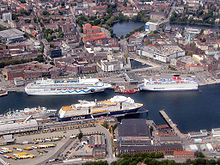
Roll-on/roll-off ships are cargo ships designed to carry wheeled cargo, such as cars, motorcycles, trucks, semi-trailer trucks, buses, trailers, and railroad cars, that are driven on and off the ship on their own wheels or using a platform vehicle, such as a self-propelled modular transporter. This is in contrast to lift-on/lift-off (LoLo) vessels, which use a crane to load and unload cargo.

In rail transport, head-end power (HEP), also known as electric train supply (ETS), is the electrical power distribution system on a passenger train. The power source, usually a locomotive at the front or 'head' of a train, provides the electricity used for heating, lighting, electrical and other 'hotel' needs. The maritime equivalent is hotel electric power. A successful attempt by the London, Brighton and South Coast Railway in October 1881 to light the passenger cars on the London to Brighton route heralded the beginning of using electricity to light trains in the world.

The Saipem 7000 is the world's third largest semi-submersible crane vessel, after the SSCV Sleipnir and the SSCV Thialf. It is owned by the Italian oil and gas industry contractor Saipem S.p.A.

A cruiseferry is a ship that combines the features of a cruise ship and a Ro-Pax ferry. Many passengers travel with the ships for the cruise experience, staying only a few hours at the destination port or not leaving the ship at all, while others use the ships as means of transportation.
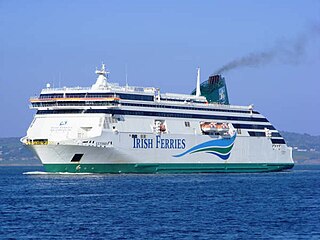
MV Ulysses is a RORO car ferry currently owned and operated by Irish Ferries. The ship was launched on 1 September 2000 at Aker Finnyards shipyard in Rauma, Finland and services the Dublin–Holyhead route.

MS Nordlys is a Norwegian-registered cruise ship operated by Hurtigruten. She was built by Volkswerft GmbH in Stralsund, Germany in 1994. She has two sister ships, Kong Harald and Richard With which also sail for Hurtigruten. The ship caught fire in September 2011 while sailing off Ålesund, Norway.

MS Superspeed 1 is a fast ro-pax ferry owned and operated by Color Line. She was built by Aker Finnyards, Rauma, Finland in 2008, and entered service on the Kristiansand—Hirtshals route on 13 March 2008.

Benchijigua Express is a fast ferry, operated by Fred. Olsen Express between the Canary Islands, Tenerife, La Gomera and La Palma in the Atlantic Ocean. She was delivered in April 2005. At 126 metres (413 ft) long, the ferry is the second-longest type of trimaran in the world, less than two metres shy of the littoral combat ships of the Independence class which were based on Benchijigua Express's design. Her body is made of aluminium with a special offshore coating, and is the second-largest vessel with an aluminium hull. The ship's name, derived from the village of Benchijigua on La Gomera where Fredrik Olsen had property, was previously used twice since 1999.

MS Pride of Rotterdam is a Dutch registered passenger and cargo roll-on/roll-off ship/cruiseferry, in service with P&O North Sea Ferries on the Hull - Rotterdam route. The cruiseferry was also featured in the video game Ship Simulator Extremes.
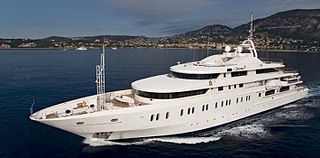
Delma is a private superyacht. It was pronounced the 27th largest private yacht in the year 2008 in Monte Carlo, Monaco. The Dubai-registered Delma measures length: 279 ft 7 • 85.23 m. It is available for charter.
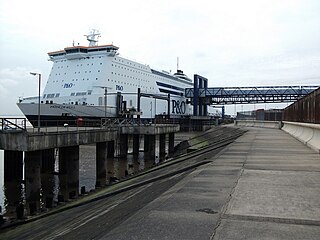
MS Pride of Hull is a Bahamas registered passenger and cargo roll-on/roll-off cruiseferry in service with P&O North Sea Ferries on the Hull – Rotterdam route.
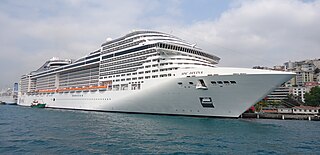
MSC Divina is a cruise ship measured at 139,400 gross tonnage (GT) owned and operated by MSC Cruises. She was constructed from 2010 to 2012 being originally named MSC Fantastica while under construction. MSC renamed her when near complete in the shipyard to honour the actress Sophia Loren.
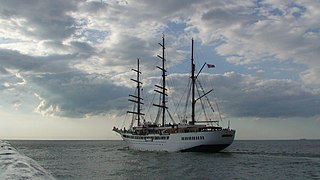
The Sea Cloud II is a large barque built as a cruise ship, and operated by Sea Cloud Cruises of Hamburg, Germany.
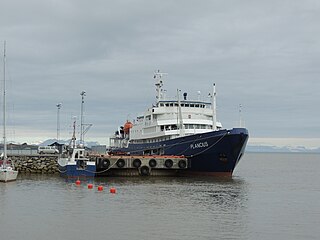
MV Plancius, formerly HNLMS Tydeman (A906), is a renovated oceanographic research vessel of the Royal Netherlands Navy now employed as a polar expedition cruise vessel by owner and operator Oceanwide Expeditions. She was commissioned into the Royal Netherlands Navy on 10 November 1976, and served until 2004, before being renovated for commercial use. The vessel was used for both military and civilian research and had a fracture zone named after it.

MS Otto Sverdrup, formerly known as MS Finnmarken, is a Norwegian coastal ship owned and operated by Hurtigruten ASA. It was built in 2002 at Kværner Kleven, Ulsteinvik, Norway, and cost around 750 million Norwegian Kroner (nok). It was part of the Hurtigruten coastal route from 2002 to 2009. In 2010 it was leased as a hotel ship in Australia. The ship returned to Norway in 2012 and is now a part of the coastal route travelling between Bergen and Kirkenes.

MS La Superba is a cruiseferry owned and operated by the Italian ferry company Grandi Navi Veloci. It was built at Nuovi Cantieri Apuania in Marina di Carrara, Italy. When it entered service, La Superba was the largest passenger ferry operating in the Mediterranean, and one of the largest in the world; joined in the following year by the sistership La Suprema, it was surpassed in 2008 by Cruise Roma of Grimaldi Ferries. Its building costed about 120 million dollars.
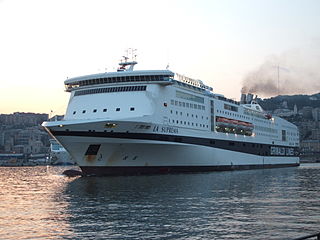
MS La Suprema is a cruiseferry owned and operated by the Italian ferry company Grandi Navi Veloci. It was built at Nuovi Cantieri Apuania in Marina di Carrara, Italy. The second of a two-ship class, La Suprema and her sistership La Superba were the largest passenger ferries of the Mediterranean at the time of their completion; they were surpassed in 2008 by Cruise Roma of Grimaldi Ferries. Its construction cost about 120 million dollars.
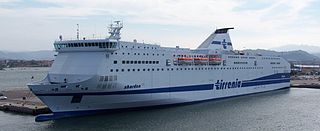
MS GNV Auriga is a cruiseferry owned and operated by Grandi Navi Veloci. It was built in Fincantieri in Castellammare di Stabia, Italy.
MS GNV Sirio is a cruiseferry owned and operated by Grandi Navi Veloci. It was built in 2004 as Nuraghes by Fincantieri at Castellammare di Stabia, Italy. In 2023, it was transferred to Moby Lines and renamed Moby Vinci. The ship reverted to Grandi Navi Veloci in 2024, taking the name GNV Sirio.

The Dongfeng diesel multiple unit, also known as the Dongfeng motor coach, and NM1, was a DMU of Ministry of Railways, and was also the first diesel-hydraulic power car and double deck passenger car of China, built by Qingdao Sifang in 1958. The train consisted two motors and four double deck trailers, and was designed for short, commuter services. Each motor has two DV12A high speed diesel engines, and has the SF2006-1 hydraulic transmission. As the set had numerous flaws, it never entered mass production, but the valuable experience gained in the design and manufacturing process was later applied to the DFH1 and Red Star-class locomotive, while the passenger cars designs were later further developed for double deck trains such as the NZJ.

